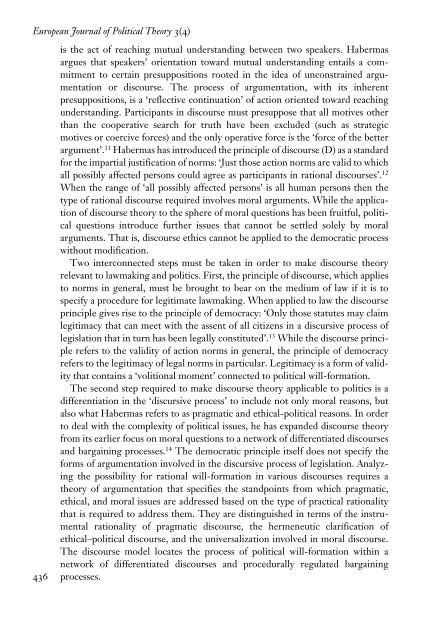Communicative Power in Habermas's Theory of Democracy
Communicative Power in Habermas's Theory of Democracy
Communicative Power in Habermas's Theory of Democracy
You also want an ePaper? Increase the reach of your titles
YUMPU automatically turns print PDFs into web optimized ePapers that Google loves.
European Journal <strong>of</strong> Political <strong>Theory</strong> 3(4)436is the act <strong>of</strong> reach<strong>in</strong>g mutual understand<strong>in</strong>g between two speakers. Habermasargues that speakers’ orientation toward mutual understand<strong>in</strong>g entails a commitmentto certa<strong>in</strong> presuppositions rooted <strong>in</strong> the idea <strong>of</strong> unconstra<strong>in</strong>ed argumentationor discourse. The process <strong>of</strong> argumentation, with its <strong>in</strong>herentpresuppositions, is a ‘reflective cont<strong>in</strong>uation’ <strong>of</strong> action oriented toward reach<strong>in</strong>gunderstand<strong>in</strong>g. Participants <strong>in</strong> discourse must presuppose that all motives otherthan the cooperative search for truth have been excluded (such as strategicmotives or coercive forces) and the only operative force is the ‘force <strong>of</strong> the betterargument’. 11 Habermas has <strong>in</strong>troduced the pr<strong>in</strong>ciple <strong>of</strong> discourse (D) as a standardfor the impartial justification <strong>of</strong> norms: ‘Just those action norms are valid to whichall possibly affected persons could agree as participants <strong>in</strong> rational discourses’. 12When the range <strong>of</strong> ‘all possibly affected persons’ is all human persons then thetype <strong>of</strong> rational discourse required <strong>in</strong>volves moral arguments. While the application<strong>of</strong> discourse theory to the sphere <strong>of</strong> moral questions has been fruitful, politicalquestions <strong>in</strong>troduce further issues that cannot be settled solely by moralarguments. That is, discourse ethics cannot be applied to the democratic processwithout modification.Two <strong>in</strong>terconnected steps must be taken <strong>in</strong> order to make discourse theoryrelevant to lawmak<strong>in</strong>g and politics. First, the pr<strong>in</strong>ciple <strong>of</strong> discourse, which appliesto norms <strong>in</strong> general, must be brought to bear on the medium <strong>of</strong> law if it is tospecify a procedure for legitimate lawmak<strong>in</strong>g. When applied to law the discoursepr<strong>in</strong>ciple gives rise to the pr<strong>in</strong>ciple <strong>of</strong> democracy: ‘Only those statutes may claimlegitimacy that can meet with the assent <strong>of</strong> all citizens <strong>in</strong> a discursive process <strong>of</strong>legislation that <strong>in</strong> turn has been legally constituted’. 13 While the discourse pr<strong>in</strong>ciplerefers to the validity <strong>of</strong> action norms <strong>in</strong> general, the pr<strong>in</strong>ciple <strong>of</strong> democracyrefers to the legitimacy <strong>of</strong> legal norms <strong>in</strong> particular. Legitimacy is a form <strong>of</strong> validitythat conta<strong>in</strong>s a ‘volitional moment’ connected to political will-formation.The second step required to make discourse theory applicable to politics is adifferentiation <strong>in</strong> the ‘discursive process’ to <strong>in</strong>clude not only moral reasons, butalso what Habermas refers to as pragmatic and ethical-political reasons. In orderto deal with the complexity <strong>of</strong> political issues, he has expanded discourse theoryfrom its earlier focus on moral questions to a network <strong>of</strong> differentiated discoursesand barga<strong>in</strong><strong>in</strong>g processes. 14 The democratic pr<strong>in</strong>ciple itself does not specify theforms <strong>of</strong> argumentation <strong>in</strong>volved <strong>in</strong> the discursive process <strong>of</strong> legislation. Analyz<strong>in</strong>gthe possibility for rational will-formation <strong>in</strong> various discourses requires atheory <strong>of</strong> argumentation that specifies the standpo<strong>in</strong>ts from which pragmatic,ethical, and moral issues are addressed based on the type <strong>of</strong> practical rationalitythat is required to address them. They are dist<strong>in</strong>guished <strong>in</strong> terms <strong>of</strong> the <strong>in</strong>strumentalrationality <strong>of</strong> pragmatic discourse, the hermeneutic clarification <strong>of</strong>ethical–political discourse, and the universalization <strong>in</strong>volved <strong>in</strong> moral discourse.The discourse model locates the process <strong>of</strong> political will-formation with<strong>in</strong> anetwork <strong>of</strong> differentiated discourses and procedurally regulated barga<strong>in</strong><strong>in</strong>gprocesses.
















